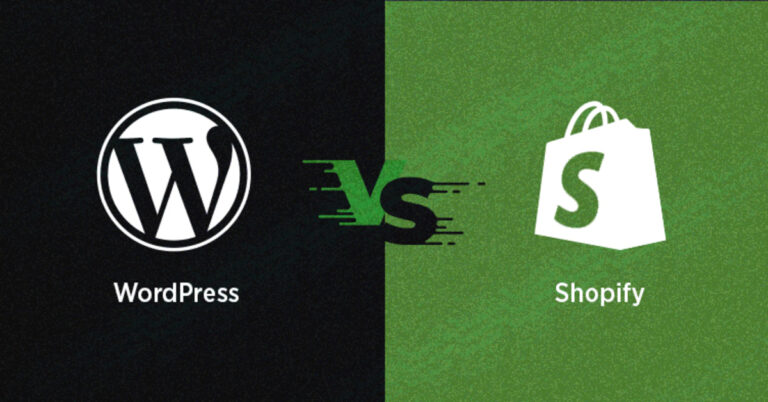Shopify vs. WordPress: Which One Is Best For Your Business?
Choosing the right platform for your online store can be daunting, especially with popular options like Shopify and WordPress vying for your attention. Both offer powerful features but cater to different needs and skill sets. So, which one is the perfect fit for your business?
Before we dive into the nitty-gritty, let’s tackle your specific questions:
Should I use Shopify or WordPress?
It depends! Shopify shines for beginners and businesses prioritizing ease of use and a quick launch. Its built-in e-commerce features and intuitive interface streamline the process. WordPress, with its flexibility and customization options, excels for unique needs and complex functionalities. However, it requires more technical knowledge and setup time.
Is Shopify good for a big business?
Absolutely! Shopify scales seamlessly to accommodate large businesses with its robust infrastructure and enterprise plans.
Should I build my website or use Shopify?
Building your own website offers maximum control but demands technical expertise. Shopify provides a comprehensive solution with minimal coding, freeing you to focus on running your business.
Should I choose WooCommerce or Shopify?
WooCommerce is a WordPress plugin that adds e-commerce functionality. It offers vast customization but requires more setup and maintenance compared to Shopify’s all-in-one solution.
Is Shopify safer than WordPress?
Both platforms prioritize security, but the answer depends on your implementation. Shopify manages server infrastructure and updates, potentially reducing risks. However, WordPress requires choosing a secure hosting provider and keeping plugins updated.
Why Shopify is better than WordPress for eCommerce?
Shopify is specifically designed for online stores, offering built-in features like product management, payments, and marketing tools. While WordPress requires plugins for these functionalities, they may require configuration and ongoing maintenance.
How Easy Are They to Use?
Shopify wins for ease of use with its drag-and-drop interface and pre-built templates. No coding knowledge is required to get started. WordPress has a steeper learning curve, especially for managing plugins and themes. However, its flexibility empowers advanced users to create highly customized experiences.
Now, let’s delve deeper into the key factors to consider:
Ease of Use: Shopify is significantly easier to set up and manage, especially for beginners. WordPress requires more technical knowledge and effort.
Customization: WordPress offers unparalleled customization with themes and plugins. Shopify provides themes and limited app integrations for customization.
Cost: Shopify charges monthly fees, while WordPress is free (though hosting, theme, and plugin costs apply).
Scalability: Both platforms scale well, but Shopify’s built-in infrastructure simplifies scaling for large businesses.
E-commerce Features: Shopify excels in built-in e-commerce features like product management, payments, and marketing. WordPress requires plugins for these functionalities.
Security: Both platforms prioritize security, but implementation matters. Shopify manages server infrastructure, while WordPress security relies on your hosting provider and plugin updates.
Ultimately, the best platform depends on your unique needs and priorities.
- Choose Shopify if:
- You prioritize ease of use and a quick launch.
- You have a small-to-medium-sized business.
- You value built-in e-commerce features and scalability.
- Choose WordPress if:
- You have unique needs and require extensive customization.
- You have an existing website built on WordPress.
- You have developer expertise or are comfortable learning technical aspects.
Remember, you can always start with one platform and migrate later if your needs evolve. Consider experimenting with free trials or exploring demo sites to get a feel for each platform before making your decision.
I hope this comprehensive overview empowers you to choose the right platform for your online business!

